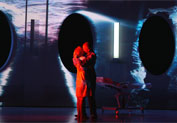OPERA SEARCH

Solaris
(2010-2012)Libretto by Reinhard Palm, based on the novel by Stanislaw Lem (G)
Major roles: S,T,Bar,B; minor roles: S,M,A; mixed chorus;
3(III=picc).2.corA.2.bcl.2.dbn-4.4.3.1-timp.perc(3)-harp-cel-strings(12.10.8.6.4)
Abbreviations (PDF)
B&B
Festspielhaus, Bregenz
Moshe Leiser & Patrice Caurier, director
Conductor: Markus Stenz
Company: Wiener Symphoniker / Prager Philharmonischer Chor
| KRIS KELVIN, psychologist | Baritone |
| HAREY, his wife | Soprano |
| SNAUT, scientist | Tenor |
| SARTORIUS, scientist | Bass |
| GIBARIAN | voice from tape |
| African Woman | Alto |
| Old Woman | Mezzo-Soprano |
| Dwarf | Soubrette Soprano |
| Solaris | Chorus |
After travelling through universe for sixteen months, the psychologist Kelvin arrives at Planet Solaris in response to alarming messages sent by the scientists based there. Although scientists already knew that Solaris – a planet of a twin star with an unpredictable orbit – does not conform to known physical laws, what Kelvin encounters on his arrival is not so much the planet’s strange phenomena as the strange behaviour of his colleagues. Some of the scientists commit suicide, until the only ones left at the station are Snaut, a bedraggled maverick and cyberneticist, and Sartorious, an inscrutable, paranoid analyser.
On his very first encounter with them, Kelvin is warned of strange apparitions; he does not have to wait long before making his own experiences. He soon has an apparition himself: his former lover, Harey, who committed suicide at the age of nineteen, meets him and starts to revive their guilt-ridden relationship. It appears as if none of the three men is able to get rid of their strange ‘visitors’.
It is the vast ocean that has the merciless power to materialise these human beings. Generations of scientists have gone mad researching it while the ocean continues to project their psychic emanations (shame and disgrace) onto their lives with pitiless indifference. The ocean, defying all scientific endeavours, becomes the true enemy of scientists; every one of them fights against it in their own way. After a dangerous experiment that seems to dissolve the boundaries between the scientist and his object, Kelvin is at the end of his tether but finds a way to face the cruel miracles of the vast and unfathomable ocean.
Reinhard Palm
"In his portrayal of Solaris with orchestra and a large chorus, Glanert has created his own soundworld for the work: alongside sections of overwhelming intensity, there is much translucent chamber music. The music is stylistically flexible, dramatically precise...and it creates both atmosphere and tension." (Alfred Zimmerlin, Neue Zürcher Zeitung, 20 Jul 2012)
"Glanert’s art of allowing the orchestral colours to shimmer is shown here anew. In masterly fashion he gives choral voice to the planet, from the first stuttering syllable to fully-formed language." (Heinz W. Koch, Badische Zeitung, 20 Jul 2012)
"[Glanert] has an exceptional knack for music drama. His score reflects the cosmic solitude just as well as the psychological terror which the scientists on Solaris repeatedly experience, exposed through the personification of their own feelings of guilt. At the same time, Glanert places great emphasis on the comprehensibility of the text, and finds a skilful balance between the recitative-like arioso and the musico-dramatic elements, which are allowed to flow in and out of each other perfectly." (Elisabeth Schwind, Südkurier, 20 Jul 2012
Dramatic, Poetic

(closing scene)
Christof Fischesser / Domkantorei Köln / Gürzenich-Orchester Köln / Markus Stenz (July 2013, "GO live!")
